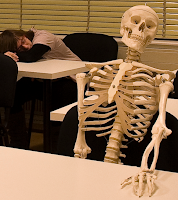I’ve
decided that what’s wrong with our healthcare system boils down to two factors—my
mother and doctors.
First, let's talk about Mom.
 My 86-year-old mother nagged me for the better part of November to get her a new pair of eyeglasses because the old ones "weren't working anymore." Naturally, I'm not ethically able to accomplish this without the assistance of an ophthalmologist (aka, eye doctor). She had cataract surgery last year, so this problem should have already been cleared up. I responded as soon as I could. The challenge was finding a nearby doctor with an appointment time open in the same year that I was calling.
My 86-year-old mother nagged me for the better part of November to get her a new pair of eyeglasses because the old ones "weren't working anymore." Naturally, I'm not ethically able to accomplish this without the assistance of an ophthalmologist (aka, eye doctor). She had cataract surgery last year, so this problem should have already been cleared up. I responded as soon as I could. The challenge was finding a nearby doctor with an appointment time open in the same year that I was calling.
First, let's talk about Mom.
 My 86-year-old mother nagged me for the better part of November to get her a new pair of eyeglasses because the old ones "weren't working anymore." Naturally, I'm not ethically able to accomplish this without the assistance of an ophthalmologist (aka, eye doctor). She had cataract surgery last year, so this problem should have already been cleared up. I responded as soon as I could. The challenge was finding a nearby doctor with an appointment time open in the same year that I was calling.
My 86-year-old mother nagged me for the better part of November to get her a new pair of eyeglasses because the old ones "weren't working anymore." Naturally, I'm not ethically able to accomplish this without the assistance of an ophthalmologist (aka, eye doctor). She had cataract surgery last year, so this problem should have already been cleared up. I responded as soon as I could. The challenge was finding a nearby doctor with an appointment time open in the same year that I was calling.Which brings us to doctors.
I made
an appointment with an ophthalmologist and after three weeks of waiting, we
arrived to get her glasses prescription checked.
Flashback:
When I was a child, we went to an eye doctor who had a practice in his home, a lovely Victorian house near Main Street in Boonton. We would sit in his parlor listening to a grandfather clock tick until the patient before us was finished. There were no televised commercials blaring. Just blessed silence. And the ticking sound. Then the eye doctor would invite us into his examining room and spend the next hour with us. He knew us by name and asked us how everyone in the family was doing. On the way out, I got a lollipop.
When I was a child, we went to an eye doctor who had a practice in his home, a lovely Victorian house near Main Street in Boonton. We would sit in his parlor listening to a grandfather clock tick until the patient before us was finished. There were no televised commercials blaring. Just blessed silence. And the ticking sound. Then the eye doctor would invite us into his examining room and spend the next hour with us. He knew us by name and asked us how everyone in the family was doing. On the way out, I got a lollipop.

Today, eye doctors are strangers located in office buildings and deal in patient volume. We stood in line for 15 minutes, much like is done at the Division of Motor Vehicles, waiting to check in with the receptionist. Then we spent another 20 minutes waiting in a room packed with dozens of other patients before being shown in to an examining room. Mom was complaining loudly and bitterly about the wait time throughout.
 |
| Patient volume is important. That means standing-room-only. |
We
were escorted back into the standing-room-only waiting room where we sat for
another 15 minutes before being re-invited into a second examining room. Like
sands in an hourglass, more of our lives passed into a sandy lump of boredom.
Just as we were both about to doze off, the doctor swept into the room. He
reviewed what the young girl had written on Mom’s chart and asked Mom if she had any vision complaints.
Which
brings us back to the patient:
 |
| Eye problems? Me? No way. |
“No,”
she replied. “I’m fine.” Mom comes from that generation of women who were
taught never to complain—except to their daughters. I reminded her that she was having problems seeing
out of one of her eyes and as a result wasn’t able to read as much or generally
see things when we went shopping.
She denied
this a third time, looking irritated, and I gave up.
Which returns
us to the doctor:
The
doctor smiled, peered intently at her eyeballs, then announced that in 30
percent of cataract surgeries, the eye clouds over, and that’s what happened to
her. The solution is a five-minute laser surgery that corrects it. Having
delivered his prognosis, he left as quickly as he had come.
By
now, both Mom and I had lost interest in her eye problems. We just wanted to
leave. As the afternoon wore on, Mom’s primary concern became getting back to
her assisted living facility for dinner.
 |
| Dinner became Mom's focus. |
The
young girl returned to fill out paperwork for my mother’s office surgery that
would take place in about six weeks. She asked my mother detailed questions
about her eyesight, trying to establish what needed improvement. Nothing,
according to my mother. The young girl flashed a disingenuous smile and told us
someone would be calling the following day to set up a surgery appointment.






